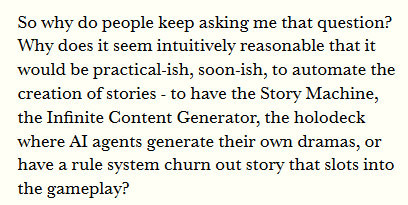

Mechanical Turks: Alexis Kennedy on storytelling AI
Will AI replace narrative designers?
Alexis Kennedy knows a thing or two about writing for games, so his answer the question is informed and informative.
I’m not terribly worried. Procedural content generation can do a lot of things that writers and designers would otherwise have to do manually. But spreadsheets can do a lot of things that accountants and project managers would otherwise have to do manually. Spreadsheets haven’t yet made accountants and project managers obsolete. I mean in the end we’ll likely all of us become obsolete - machines will end up doing accountancy and project management and writing and neurosurgery - but we’re a long way from that.
More interestingly, he goes into detail about why he thinks that question gets asked, and what it can tell us about the value of writing. I’ll let you read it for yourself–its definitely worth it–but the key bit I want to focus on here is this:
So when a player wants more story in a game, what they actually often want is more interesting and novel things in the game. That’s not just a resource problem. It’s also a design problem.
This is a key insight.
Personally, I’m less interested in procedural generation that attempts to generate new content endlessly and more interested in tools that make it easier for designers to create flexible and expressive results.
The plot generators built for NaNoGenMo will continue to get more sophisticated, and may even be able to sustain an entire, readable novel someday soon…but even then, it will still be easier for a writer to seed an entirely different generator than it will be to adjust the first generator to output two kinds of ideas.Novelty is basically the inverse of pattern recognition, and humans are good at pattern recognition. Thus, humans do randomness badly, but novelty pretty well.
I’m more interested in procedural generation that acts as a support structure for that novelty. For example, if adding a new character to an interactive story means writing a lot of boilerplate reactions, a system that automates some of that detail or prompts the writer to fill it in will make it easier to make more characters in greater depth.
For that matter, a tool that detects obscure but valid configurations of the story elements and prompts the writer to expand them (or directs them to areas that need the most fleshing out) would be really useful.
http://www.gamesindustry.biz/articles/2016-12-15-mechanical-turks
